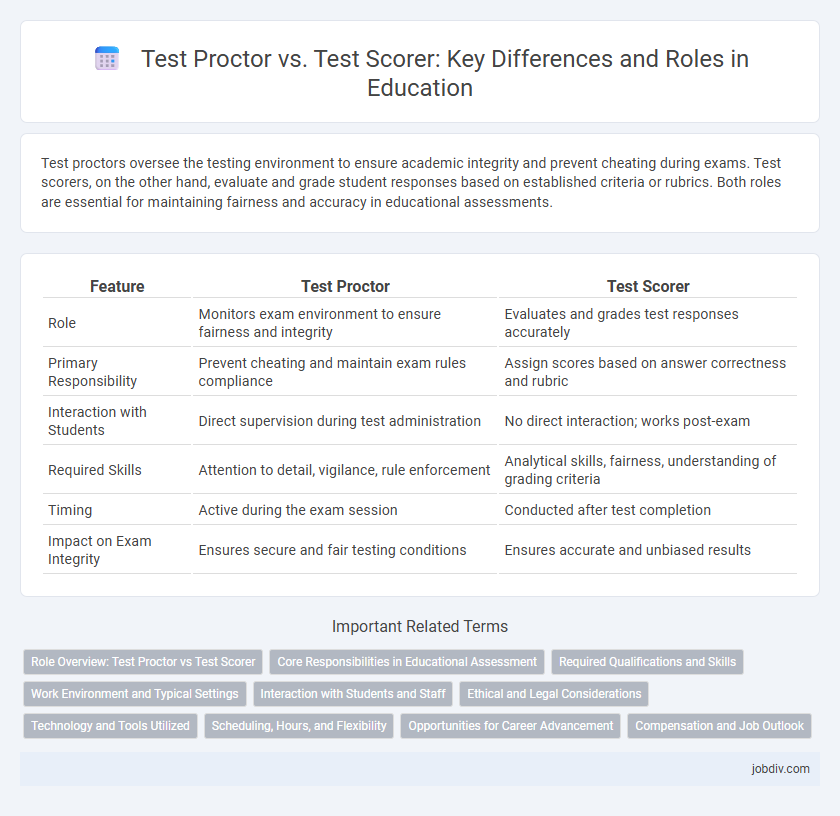Test proctors oversee the testing environment to ensure academic integrity and prevent cheating during exams. Test scorers, on the other hand, evaluate and grade student responses based on established criteria or rubrics. Both roles are essential for maintaining fairness and accuracy in educational assessments.
Table of Comparison
| Feature | Test Proctor | Test Scorer |
|---|---|---|
| Role | Monitors exam environment to ensure fairness and integrity | Evaluates and grades test responses accurately |
| Primary Responsibility | Prevent cheating and maintain exam rules compliance | Assign scores based on answer correctness and rubric |
| Interaction with Students | Direct supervision during test administration | No direct interaction; works post-exam |
| Required Skills | Attention to detail, vigilance, rule enforcement | Analytical skills, fairness, understanding of grading criteria |
| Timing | Active during the exam session | Conducted after test completion |
| Impact on Exam Integrity | Ensures secure and fair testing conditions | Ensures accurate and unbiased results |
Role Overview: Test Proctor vs Test Scorer
Test proctors monitor exam environments to ensure academic integrity by preventing cheating and maintaining test conditions, while test scorers evaluate and grade exam responses accurately according to established rubrics and standards. Proctors are responsible for overseeing test administration logistics, including verifying candidate identities and timing, whereas scorers focus on objective assessment and data entry of test results. Both roles are critical in maintaining the reliability and validity of educational assessments.
Core Responsibilities in Educational Assessment
Test proctors ensure exam integrity by monitoring test-takers, verifying identities, and enforcing exam rules during assessments. Test scorers focus on accurately evaluating student responses, applying scoring rubrics, and recording results to maintain consistent and fair grading. Both roles are essential for upholding standardized testing protocols and ensuring reliable educational assessment outcomes.
Required Qualifications and Skills
Test proctors require strong attention to detail, excellent communication skills, and the ability to enforce exam rules impartially, often needing a high school diploma or equivalent and specialized training in test administration. Test scorers must possess subject-matter expertise, analytical skills, and accuracy in evaluating responses, typically requiring a bachelor's degree in the relevant field and experience in assessment evaluation. Both roles emphasize integrity and confidentiality but differ in educational background and technical competencies essential to their functions.
Work Environment and Typical Settings
Test proctors primarily operate in controlled, in-person environments such as classrooms, testing centers, or examination halls, where monitoring exam conditions and preventing cheating are critical. Test scorers often work in quieter, more isolated settings like offices or home workspaces, focusing on evaluating written or digital responses with accuracy and consistency. Both roles require attention to detail but differ significantly in their physical work environment and direct interaction with test-takers.
Interaction with Students and Staff
Test proctors ensure exam integrity by actively monitoring students during assessments, providing real-time support and addressing any issues that arise, thus maintaining a secure testing environment. Test scorers, on the other hand, primarily interact with student submissions and collaborate with educational staff to evaluate and standardize grading, focusing on accuracy and consistency rather than direct student engagement. Effective communication between proctors and scorers supports a streamlined testing process, enhancing overall educational assessment quality.
Ethical and Legal Considerations
Test proctors ensure exam integrity by preventing cheating and maintaining a secure testing environment, adhering strictly to ethical guidelines and legal standards such as the Family Educational Rights and Privacy Act (FERPA). Test scorers must objectively evaluate exam responses without bias, upholding confidentiality and accuracy in compliance with professional testing regulations and intellectual property laws. Both roles require rigorous adherence to ethical principles to protect the validity of assessments and the rights of test-takers.
Technology and Tools Utilized
Test proctors utilize advanced online monitoring software, AI-powered facial recognition, and secure browser technologies to ensure exam integrity during remote assessments. Test scorers rely heavily on automated grading systems, machine learning algorithms, and optical character recognition (OCR) tools to efficiently evaluate both objective and subjective responses. Emerging technologies like blockchain and adaptive learning platforms are increasingly integrated to enhance accuracy, security, and scalability in both proctoring and scoring processes.
Scheduling, Hours, and Flexibility
Test proctors typically work scheduled shifts during exam periods, requiring availability for specific hours that may include evenings or weekends, while test scorers often have more flexible hours, as their work can be completed remotely and asynchronously. Proctors must be physically present or connected live to monitor exams, limiting their scheduling options compared to scorers who can manage their workload according to personal schedules. Flexibility is higher for test scorers due to the nature of grading tasks, whereas test proctors face stricter time commitments aligned with exam administration.
Opportunities for Career Advancement
Test proctors can advance to supervisory roles managing testing centers or transition into instructional design and assessment coordination positions. Test scorers with expertise in subject matter can progress to lead scoring teams or specialize in psychometrics and data analysis for assessment development. Both roles offer pathways to education administration and policy-making careers through skill development in evaluation and quality assurance.
Compensation and Job Outlook
Test proctors typically earn an hourly wage ranging from $10 to $20, with job availability remaining steady due to consistent demand in educational institutions and certification organizations. Test scorers, often hired on a part-time or contract basis, earn between $15 and $30 per hour depending on the complexity of the exams and experience, with growth prospects tied to the expansion of standardized testing. Both roles offer flexible work options, but test scorers may encounter more seasonal fluctuations linked to academic calendars and testing schedules.
Test Proctor vs Test Scorer Infographic

 jobdiv.com
jobdiv.com